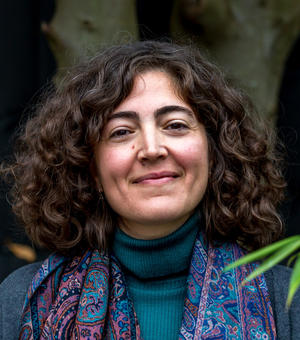Dr Müge Ergun
Research Interests
Early farming communities, the beginnings of sedentary way of life, domestication of plants, crop husbandry and foraging practices, food and culture, social organization and labour management, landscape management and people-environment interactions.
Geographic Area
Southwest Asia, East Mediterranean, Southeast Europe.
Co-Investigator on the Agricultural Origins in the Greater Fertile Crescent
Müge Ergun is an archaeologist and archaeobotanist whose research focuses on agricultural practices and foraging strategies throughout prehistory, and their impact on the economic and socio-cultural lives of the past communities. Her research interest further extends to understand the effects of people’s diverse plant-based activities on the environment. She is currently a post-doctoral researcher in The EXPLO project, where she takes part in the interdisciplinary research on the earliest farming communities in the South of Balkans.
She received her Ph.D. in archaeology from the Istanbul University’s Department of Prehistory and the Paris 1 Panthéon-Sorbonne University Doctoral School of Archaeology (co-tutelle, 2016). Dr. Ergun was previously an environmental archaeology post-doctoral fellow in the Koç University’s Research Center for Anatolian Civilizations (ANAMED). She has recently been working on the projects focusing on early Neolithic communities (9th-6th millennium cal. BC) from Central Anatolia (Aşıklı Höyük and Balıklı), Mediterranean and Aegean Anatolia (Girmeler Cave and Uğurlu-Zeytinli) and Cyprus (Tatlısu-Çiftlikdüzü/ Akanthou-Arkosykos), as well as later Hellenistic-Roman site (Pergamon) in the Aegean.
2021 | Journal Article | Anatolica
Erdoğu B., Korkut T., Takaoğlu T., Atıcı L., Kayacan N., Guilbeau D., Ergun M. and Doğan T. 2021.
Late Pleistocene and Early Holocene finds from the 2020 trial excavation at Girmeler, Southwestern Turkey, Anatolica 47, 299-320.
January 2021 | Journal Article | Vegetation History and Archaeobotany
Rousou M., Parés A., Douché C., Ergun M., and Tengberg M. 2021.
Identification of archaeobotanical Pistacia L. fruit remains: implications for our knowledge on past distribution and use in prehistoric Cyprus, Vegetation History and Archaeobotany 30(5), 623-639.
December 2018 | Chapter | The Early Settlement at Aşıklı Höyük: Essays in honour of Ufuk Esin
Ergun M., Tengberg M., Willcox G. and Douché C. 2018
Plants of Aşıklı Höyük and Changes Through Time: First archaeobotanical results from
the 2010-14 Excavation Seasons. In: The Early Settlement at Aşıklı Höyük: Essays in
honour of Ufuk Esin (ed. M. Özbaşaran, G. Duru and M. C. Stiner), Ege Yayınları, Istanbul, 191-219.
January 2018 | Journal Article | Paléorient
Ergun M. 2018.
«Where the wild things are». Contextual insights into wild plant exploitation at Aceramic Neolithic Aşıklı Höyük, Turkey, Paléorient 44(2), 9-28
June 2014 | Chapter | Çatalhöyük Excavations: The 2000-2008 Seasons
Özbaşaran M., Duru G., Bogaard A., Boz B., Charles M., Ergun E., Gültekin H., Kayacan N., Russell N., Özbudak D.T., Twiss K.C. and Yalman N. 2014.
Istanbul (IST) Area of the East Mound”. In: Çatalhöyük Excavations: The 2000-2008 Seasons, (ed. I. Hodder), British Institute at Ankara (BIAA Monograph 46) and Cotsen Institute of Archaeology Press (Monumenta Archaeologica 29), London/ Los Angeles,621-658.
November 2013 | Chapter | Humans and landscapes of Çatalhöyük: reports from the 2000- 2008 seasons
Bogaard A., Charles M., Livarda A., Ergun M., Filipović D. and Jones G. 2013.
The archaeobotany of mid-later Neolithic occupation levels at Çatalhöyük. In: Humans and landscapes of Çatalhöyük: reports from the 2000-2008 seasons, (ed. I. Hodder), British Institute at Ankara (BIAA Monograph 47) and Cotsen Institute of Archaeology Press (Monumenta Archaeologica 30), Los Angeles/ London, 93-128.




